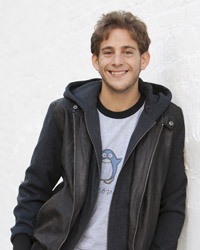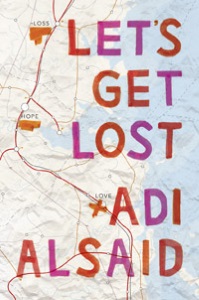Adi Alsaid Talks with Roger
Talks with Roger is a sponsored supplement to our free monthly e-newsletter, Notes from the Horn Book.

Talks with Roger is a sponsored supplement to our free monthly e-newsletter, Notes from the Horn Book. To receive Notes, sign up here.
Sponsored by![]()
 When I talked with Adi Alsaid about his first novel, Let's Get Lost, which is about a road trip, he was, appropriately enough, on a road trip in San Francisco and headed on up to Oregon.
When I talked with Adi Alsaid about his first novel, Let's Get Lost, which is about a road trip, he was, appropriately enough, on a road trip in San Francisco and headed on up to Oregon.Roger Sutton: Where do you usually live?
Adi Alsaid: I'm based in Mexico City. I was born and raised there. I went to school in Las Vegas, lived in Israel for a bit, lived in California for a bit, and I've been back in Mexico City for about four years now.
RS: Kind of like your own personal road trip.
AA: I'm aiming for a lifelong road trip.
RS: Where do you most want to go?
AA: I've seen very little of Europe. I've only spent some time in London, and I definitely want to see a lot more. You're actually speaking to me in the middle of a road trip. After ALA in Vegas, I drove over to L.A. for a wedding. Now I'm in San Francisco, and I'm camping — all over the Pacific Northwest, up into Seattle. My next road trip is helping my sister move to Cincinnati from Las Vegas.
RS: Let's talk about your book. I think it's really interesting that when you begin reading it, you think it's going to be about a different person than it actually is. You think it's going to be Hudson's story, but really, ultimately, it is Leila's story. I'm wondering how you came up with this structure.
AA: I've always been drawn to multiple perspectives, both as a reader and as a writer. I like telling one story from as many perspectives as the narrative will allow. And I thought it would be really interesting to tell a road-trip story through the eyes of characters who are stationary, who are going through their own issues, their own lives, when this girl comes crashing in. And then to tell her whole story through these little snippets from other teens. I think part of that actually comes from road-tripping and being interested in all these passing characters that I meet. Getting into strangers' heads and imagining myself through their eyes.
RS: When you say you get into strangers' heads, are you really getting into their heads, or are they, in fact, something in your head?
AA: Yeah, I'm sure I'm imagining things completely wrong from their perspective.
RS: That's what makes good fiction, though.
AA: Last night I was at this dive bar in San Francisco. It was kind of like this open mic thing where people would sign up to sing and they would also perform with others, half open mic, half karaoke, a little bit of a fifty-person rotating band. The whole time I was wondering who these people are, how long they've played together, how many were there for the first time and how many are there every week. I'm sure I made a lot of wrong assumptions about them, but it was fun to do.
 RS: It sounds like you get a lot of material this way. Which of the characters in Let's Get Lost came first in your imagination?
RS: It sounds like you get a lot of material this way. Which of the characters in Let's Get Lost came first in your imagination?AA: It was Leila. But the very first writing I did was Hudson's, and then Bree's. I wrote the book in order, so I didn't really get to know Leila until after I started writing Hudson's piece. Just as the reader gets to slowly find out about her along the way, I was doing the exact same thing while writing.
RS: So you didn't know what was really driving her — so to speak — until you got to the end?
AA: I did have the whole book outlined so I knew, generally speaking, what her story was. But the way I think of it is that outlining is kind of architecture and writing is interior design, and you don't really have a home until you get to that part. I had the architecture for Leila but none of the interior design.
RS: I'm wondering what you read as a teenager.
AA: Stephen King was one of my big go-tos. I started pretty early with Stephen King, seventh, eighth grade. And then I moved into Kurt Vonnegut. He was definitely my favorite throughout high school. I didn't get into young adult fiction until the last few years.
RS: You're in an interesting position, being a male author in this field, and also publishing with Harlequin. I think they're doing a good job of breaking out of publishing just category romances. As you find yourself moving into this young adult world, what do you think of it?
AA: I love it. First of all, I think I have a skewed perspective because of how much Harlequin Teen has been doing for me, so of course I've been loving the whole experience. But in general, I think the young adult community is very tightly knit. There's a lot of support among authors, bloggers, and readers. I've already gotten so much support from readers. I don't know if people in adult fiction can be quite as enthusiastic as young adult readers are.
RS: I think teenagers love books in a way that sometimes as adults we forget. What is your reading like now?
AA: Right now I'm reading Vicious, by Victoria Schwab. She's a young adult writer and this is her first adult book. I've been following her on Twitter for a while and we met at ALA. She once said something on Twitter about how books don't happen in this insane moment of inspiration, they happen day by day by day by day. And I've been using that myself — day by day by day.
RS: Like Anne Lamott's Bird by Bird. What's going to be your next book? Tell me it's not a sequel?
AA: It is not a sequel.
RS: Hallelujah.
AA: I'm in the middle of the draft right now, doing revisions. It's another young adult contemporary, multiple perspectives. I am fairly secretive about the early stages of my writing, so I haven't let that cat out of the bag quite yet.
RS: It's nobody's business but your own. I have a question about Las Vegas. We were just there [for ALA]. What kind of a town is it like to live in?
AA: A lot of the notions people have about it are pretty limited to the Las Vegas Strip. And a lot of locals, in my experience, we stay away from the Strip. A lot of people work there and they don't want to go back on their free time. They don't want to see the drunken tourists and all that. The rest of the town — to me, it feels a lot like many other cities throughout the U.S. If you were outside the Strip, you probably wouldn't even recognize it as Las Vegas if it weren't for the desert landscape and the fact that there are slot machines. For a college student like I was at that time, it was extremely convenient, because everything is open twenty-four hours a day. I didn't have money to go gambling. I wasn't twenty-one yet, so I couldn't go drinking either. But I could go to a twenty-four-hour Starbucks and play board games with my friends, or go write in the middle of the night. I could go bowling at midnight. I could eat Vietnamese food at three in the morning. It was pretty much the city where everything is available at all times.
RS: So where is the next place that you will actually live, if there is such a place?
AA: I've always had the urge to go visit the Greek isles. I think that would be a great place to disappear to for a few months, write a book while I'm there.
RS: All right. Groovy. Well, drive carefully.
AA: All right. Thank you so much for the call, Roger. I appreciate it.
RS: Sure thing. Good luck with the book. I really like it.
AA: Thank you.
More from The Horn Book
Sponsored by![]()
RELATED
RECOMMENDED
ALREADY A SUBSCRIBER? LOG IN
We are currently offering this content for free. Sign up now to activate your personal profile, where you can save articles for future viewing.







Add Comment :-
Be the first reader to comment.
Comment Policy: